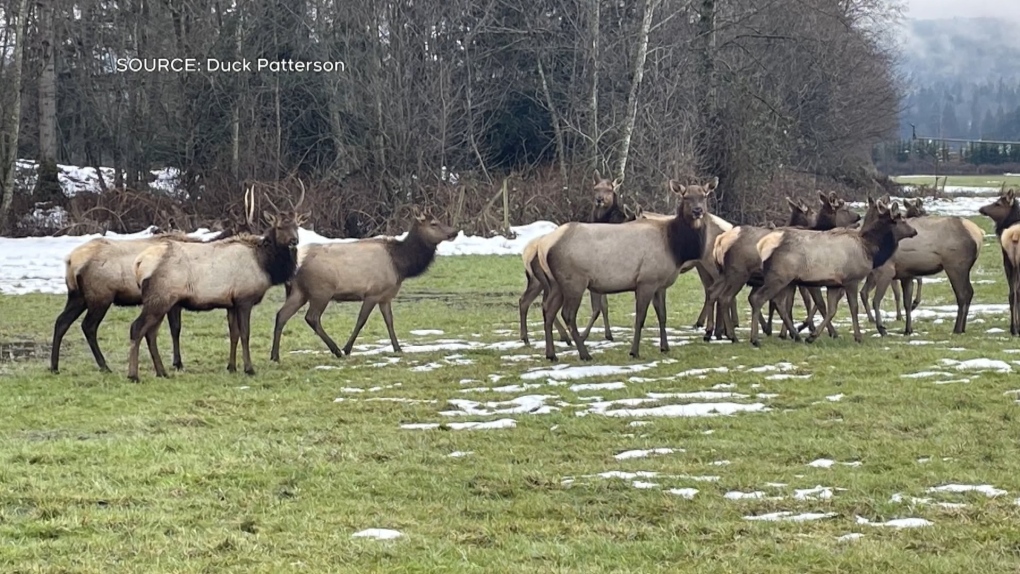Vancouver Island farmers struggle to deal with threatened elk species
 (Duck Patterson)
(Duck Patterson)
Farmers in the Cowichan Valley are losing crops and dealing with property and field damage caused by Roosevelt Elk, which have become a regular fixture on some farms in the area.
The threatened species typically moves to lower elevations during the winter months searching for more plentiful food, but in the last few years, in the Duncan area, some herds have been staying year-round on farmland.
In North Oyster, where Howie Davis has farmed cattle for more than 50 years, a herd of 12 elk showed up in December four years ago. Fortunately for him, they've so far always left by February or March.
"The herds are expanding every year," said Davis.
In the few months the elk are on the farm, Davis said they cause a lot of damage, knocking down fences, tearing the hay fields up with their hooves and eating whatever hay is growing over the winter "right down to nothing."
The elk damage to the hay fields has reduced the number of harvests from four to three in a season, said Davis.
"That’s one crop you don’t get to sell, less income," he said. "[The provincial government has] been compensating me for that … not to what it costs."
A University of Alberta research project intended to reduce human-elk conflict in the Cowichan Valley started in August 2021.
The team has set up multiple trail cameras in the valley to gather data on the herds' numbers and movements.
"To implement any sort of management strategies we need to have a good understanding of what’s happening with the population, how many are there, where are they on the landscape and how are they interacting with human infrastructure?" said Kate Rutherford, a masters student at the University of Alberta.
Rutherford says the provincial government has put a lot of effort into increasing the elk herds in the Cowichan Valley to create a healthy, sustainable population, which seems to have paid off.
"Everyone wants the population to be at healthy levels," she said.
"There’s also that balance, right, with maintaining a healthy population size but also minimizing the occurrence of human-elk conflict, which is going to increase as urbanization increases," she added.
Researchers are also planning to test deterrents to keep elk out of farms.
"We plan to broadcast predator vocalization on the perimeter of these fields where we’re currently monitoring elk using camera traps, and they will be broadcasted when triggered by animal movement," said Rutherford.
The team is also asking landowners in the area to contribute to their research by reporting elk sightings to them either through the iNaturalist app or by emailing the team directly at rooselk@ualberta.ca
The researchers hope to share their work with farmers and the provincial government as way to help with the management of Roosevelt Elk.
CTVNews.ca Top Stories

'He's in our hearts': Family and friends still seek answers one year after Nathan Wise’s disappearance
It’s been a year since Nathan Wise went missing and his family is no closer to finding out what happened to him.
'My family doctor just fired me': Ontario patients frustrated with de-rostering
Dozens of Ontarians are expressing frustration in the province’s health-care system after their family doctors either dropped them as patients or threatened to after they sought urgent care elsewhere.
Ottawa pizzeria places among top 20 deep-dish pizzas in the world at international competition
An Ottawa pizzeria is being recognized as one of the top 20 deep-dish pizzas in the world.
Canada Post cracks down on Nunavut loophole to get free Amazon Prime shipping
Amazon's paid subscription service provides free delivery for online shopping across Canada except for remote locations, the company said in an email. While customers in Iqaluit qualify for the offer, all other communities in Nunavut are excluded.
Edibles, armchairs and adapters: Here are the recalls for this week
Health Canada announced various product recalls this week, including electric adapters, armchairs, cannabis edibles and vehicle components.
Putin replaces Russian defence minister in rare cabinet shakeup
Russia’s President Vladimir Putin began a Cabinet shakeup on Sunday, proposing the replacement of Sergei Shoigu as defence minister as he begins his fifth term in office.
Suspect sought after fatal slashing in downtown Toronto
Police are searching for a suspect in a homicide investigation after a man was slashed in downtown Toronto on Sunday.
Wildfire near Fort McMurray more than triples overnight, several evacuation alerts remain in place
The fire burning near Fort McMurray grew from 25 hectares to 5,500 hectares over the weekend.
WATCH Dashcam video shows terrifying near-miss on two-lane northern Ontario highway
There were some scary moments for several people on a northern Ontario highway caught on video Thursday after a chain reaction following a truck fire.

































